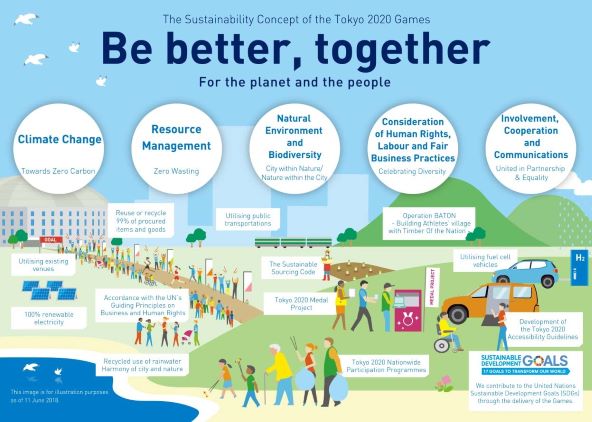

The 2020 Tokyo Olympic and Paralympic organizing committee, according to the Japanese media, are aiming to “fully power the games with renewable energy.” Wind and solar energy will be used to power the stadiums.
The committee says that if no green measures are taken, the games will generate 3.01 million metric tons of carbon dioxide emissions. For the Japanese, traditonally a technology powerhouse, the games could also serve as a great opportunity to showcase their latest when it comes to sustainability.


Moreover, the need for green movement is necessary as the 2016 Paris Agreement on cutting greenhouse gas emissions that will come into effect in 2020.
The Japanese Olympics committee has many plans in place, like all the stadiums will be powered by Renewable energy sources. The roads will be covered with solar panel coated with a resin so that cars can easily drive on top of them.
Recycling: Meanwhile, medals will be made from recycled old gadgets. The small amounts of precious metals found in devices like cell phones, computers and microprocessor chips will be extracted and can create an estimated 5,000 medals. This particular endeavor has involved launching a nation-wide drive amongst Japanese citizens to donate their used electronic devices, which tackles the problem of e-waste recycling. Bronze medals are finished and so has half of silver and gold medals to be used in the Olympics 2020, till now.


Rewarding: If you thought these games will be ordinary, think again. Japan plans to deploy robots throughout various venues at the 2020 Olympics to help carry bags, translate languages for better communication and much more. The 2020 Olympics will also see the driverless cars for tourists. According to Nikkei, the driverless cars are developed by Tokyo-based robot maker ZMP, operated by taxi company Hinomaru Kotsu, and partly financed by the Tokyo Metropolitan Government.
The aim is for the driverless taxi to begin commercial operations in 2020 once the Olympics begin, in order to help ease the transport crunch.
Repurposing: All the Olympic torches will be made out of recycled metals from Fukushima earthquake disaster 2011. After the earthquake, temporary shelters were made out of aluminum for the displaced people. Japanese will be repurposing the scrapped metal from there. The committee has even announced that 99% of all goods used in the games will also be reused or recycled. All the organizers say that the raw materials needed to manufacture new goods and equipment will be sustainably sourced. They also plan to rent equipment rather than buy new sports equipment.
There is much to learn from the Japanese concept of kaizen which refers to activities that continually improve all functions and involve everyone in the process.
1. The mandate for blending Compressed Biogas (CBG) with natural gas has come into effect…
Andhra Pradesh is striving towards greening its energy sector with quite some speed. In a…
With an objective to bolster India’s green energy goals, a Tripartite Agreement has been signed…
The Union MNRE Minister Pralhad Joshi launched the Green Hydrogen Certification Scheme of India (GHCI)…
India’s energy conglomerate Bharat Petroleum Corporation Limited (BPCL) has commissioned a 5MW green hydrogen plant…
In a historical development, the European Space Agency (ESA) has successfully launched its pioneering ‘Biomass’…